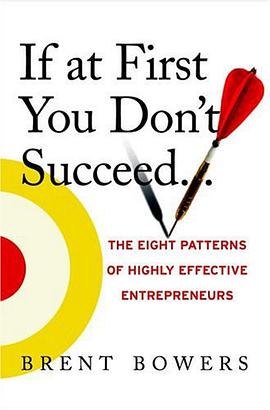

具体描述
Book Description
At age nine, Cameron Johnson started an Internet company.
Pete Amico quit his job on his first day because he didn’t feel like taking orders from his boss.
Greg Herro built a successful business selling diamonds made from the carbon extracted from ashes.
If any of these people remind you of yourself, you just might have the kind of personality to take the small business world by storm.
In If at First You Don't Succeed..., Brent Bowers, the small-business editor for the New York Times reveals the eight patterns that highly successful entrepreneurs share – and what we can learn from them.
Brent Bowers, in covering small business for decades at the Wall Street Journal and the New York Times, has chronicled the rise and fall of hundreds of start-ups. In If at First You Don’t Suceed…, he analyzes the common characteristics shared by dozens of successful small-business owners and their companies. Drawing on extensive interviews and research, as well as on the experiences and expertise of business consultants, venture capitalists, academics, and the entrepreneurs themselves, he describes the key traits that successful entrepreneurs have in common.
Among them:
? The ability to spot and seize opportunities
? An overwhelming urge to be in charge coupled with a gift for leadership
? The flexibility to come up with creative, out-of the-box solutions to problems or obstacles
? Incredible energy and tenacity in the pursuit of their goals
? Unwavering faith in their business
? The ability to take smart risks
? The ability to bounce back from setbacks and see failure as just one step on the path to ultimate success
For anyone thinking about starting a business, or attempting a start-up a second or third time, this book offers invaluable lessons and insights.
From Publishers Weekly
Bowers, a business editor at the New York Times, tries to get past the generalities about what makes a successful entrepreneur—they "notice things," they "want to be in charge"—by bulking up on real-life illustrations of the broader principles. He gracefully delineates key entrepreneurial traits: an aptitude for seizing opportunity; rejection of authority; a long history of innovation; doggedness; agility, or a "tolerance for ambiguity" in the marketplace; enthusiasm tempered by pragmatism; and an ability to "fail upward," or learn from mistakes. The individual stories can be entertaining and enlightening—especially in later chapters on impulsiveness and coping with failure that contain vivid examples of what not to do. But Bowers's sample of small business owners begins to feel somewhat constricted when he repeatedly revisits the same people (like Cameron Johnson, who started his first dot-com company when he was nine years old), and his theories on the psychological roots of the entrepreneurial personality (e.g., hard-to-please fathers, or "borderline bipolar" disorder) make for the book's least useful content. Still, this is a well-organized, nimbly reported account for those seeking answers to the riddle of entrepreneurship. (Apr. 18)
From Booklist
Bowers, newspaper editor and former reporter, presents a thought-provoking review of the traits necessary to succeed as an entrepreneur. He organizes his chapters around personal qualities that he considers essential, and these include spotting opportunities that no one else has seen and seizing them; rejection of authority and the need to run one's own show; characteristics such as curiosity, enthusiasm, and self-confidence since there isn't an entrepreneurial gene; nimbleness in the sense of tolerance for ambiguity; tenacity or refusal to give up; unshakable conviction in the potential for one's product; constantly testing the concept by asking, "Will it work?"; and the ability to fail upward, instinctive ability to determine what went wrong, and learn from mistakes. This is an excellent, easily read primer for aspiring entrepreneurs that will help them judge their prospects for success. It also is a valuable tool for current entrepreneurs for use in evaluating their strengths and weaknesses and gaining insight from the experience of others.
Mary Whaley
Synopsis:
There are lots of books that explain how to start and build a business. IF AT FIRST YOU DON'T SUCCEED...is the first book to acknowledge a hard fact: most leading entrepreneurs failed the first time out. Brent Bowers, who has chronicled the rise and fall of hundreds of start-ups, offers a fresh look at what it takes to make it as an entrepreneur. Among other traits succesful entrepreneurs have in common is a belief that failure is just a step on the way to ultimate success.
Bowers analyzes the common characteristics of more than fifty small-business owners and their companies. Drawing on his research at the Times, as well as the experiences and expertise of family business consultants, small-business officials, venture capitalists, and academia, he describes the key traits that successful entrepreneurs share, including:
-An overpowering impulse to be in charge
-A high tolerance for risk
-A talent for inspiring loyalty in others
-An indifference to wealth except as a measure of success
-An almost religious belief in his or her company's product
-A steadfast resilience and the ability to bounce back when things go wrong
The entrepreneurs Bowers talks with refuse to see failure as failure. They view it as a lesson in how to redirect their efforts. Their insights and experience are invaluable for anyone thinking about starting a business, whether they are embarking on the start-up road for the first time, or going down it a second or third time.
About Author
BRENT BOWERS has been a business editor for The New York Times for the past ten years. He was formerly a reporter and editor for The Wall Street Journal. He lives in Brewster, Massachusetts.
Book Dimension :
length: (cm)24.1 width:(cm)16.3
作者简介
目录信息
读后感
评分
评分
评分
评分
用户评价
相关图书
本站所有内容均为互联网搜索引擎提供的公开搜索信息,本站不存储任何数据与内容,任何内容与数据均与本站无关,如有需要请联系相关搜索引擎包括但不限于百度,google,bing,sogou 等
© 2026 book.wenda123.org All Rights Reserved. 图书目录大全 版权所有




















